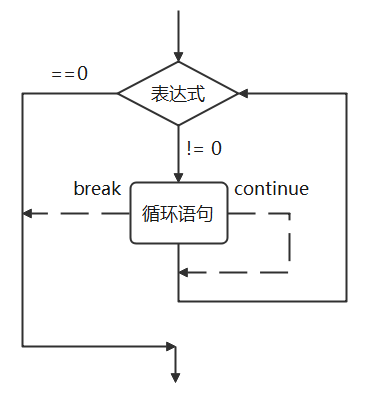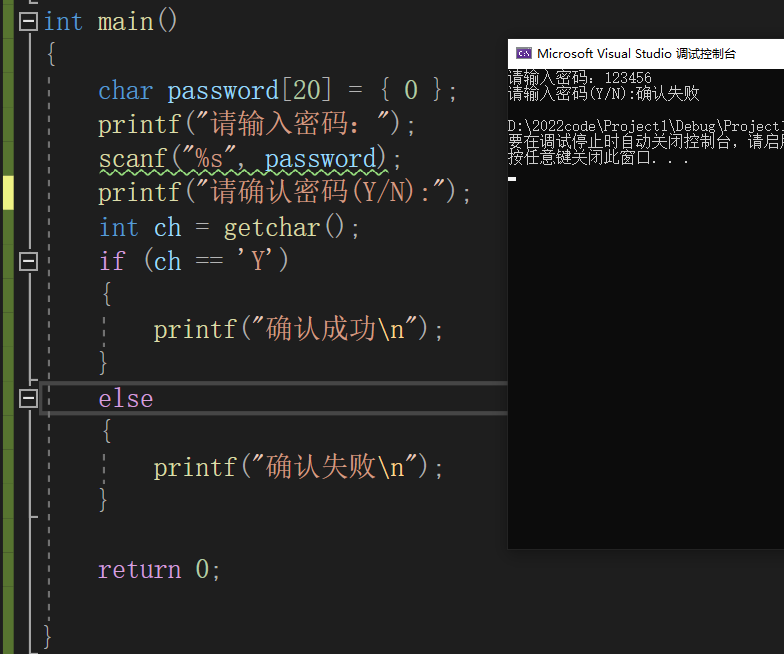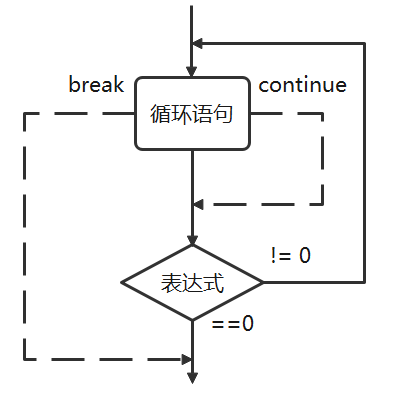catalogue
1, Branch statement
1. if statement
- 0 means false, non-0 means true
- If the result of the expression is true, the statement is executed
-
Grammar
If (expression 1)
Statement 1;
Else if (expression 2)
Statement 2;
else
Statement 3;
-
Examples
//else suspended
#include <stdio.h>
int main()
{
int a = 0;
int b = 2;
if (a == 1)
if (b == 2)
printf("hehe\n");
else //else matches the latest if, and the print result is empty
printf("haha\n");
return 0;
}//Exercise 1 judge whether a number is odd
#include <stdio.h>
int main()
{
int num = 15;
if (num % 2 == 1)
printf("Odd number\n");
return 0;
}//Exercise 2 output odd numbers between 1-100
#include <stdio.h>
int main ()
{
int i = 1;
while (i <= 100)
{
printf("%d ",i);
i += 2;
}
return 0;
}2. switch statement
- It is mostly used in the case of many branches
- The break statement jumps out of the switch statement
- If there is no break statement, it will be executed downward from the incoming case statement
- The default statement is an exit to other options, regardless of order
-
grammar
Switch (expression)
{
case constant expression 1: statement sequence 1;
case constant expression 2: statement sequence 2;
default: statement sequence 3;
}
-
example
//Print the week corresponding to the input number
#include <stdio.h>
int main ()
{
int day = 0;
scanf("%d", &day);
switch (day) //Integer expression
{
case 1: //integral constant expression
printf("Monday\n");
break;
case 2:
printf("Tuesday\n");
break;
case 3:
printf("Wednesday\n");
break;
case 4:
printf("Thursday\n");
break;
case 5:
printf("Friday\n");
break;
case 6:
printf("Saturday\n");
break;
case 7:
printf("Sunday\n");
break;
}
return 0;
}//Function of break statement
#include <stdio.h>
int main ()
{
int day = 0;
scanf("%d", &day);
switch (day)
{
case 1: //There are no break s, and they slide down in turn
case 2:
case 3:
case 4:
case 5:
printf("weekdays\n");
break;
case 6:
case 7:
printf("Rest Day\n");
break;
}
return 0;
}//default clause
#include <stdio.h>
int main ()
{
int day = 0;
scanf("%d", &day);
switch (day)
{
case 1: //There are no break s, and they slide down in turn
case 2:
case 3:
case 4:
case 5:
printf("weekdays\n");
break;
case 6:
case 7:
printf("Rest Day\n");
break;
default: //Exits for other options, regardless of order
printf("Input error\n");
break;
}
return 0;
}//practice
#include <stdio.h>
int main()
{
int n = 1;
int m = 2;
switch (n) //n=1, enter from case 1
{
case 1:m++; //n=1,m=3
case 2:n++; //n=2,m=3
case 3:
switch (n) //n=2, enter from case 2
{
case 1:n++;
case 2:n++;m++; //n=3,m=4
break; //Jump out of the switch statement
}
case 4:m++; //Enter case 4, n=3, m=5;
break; //Jump out of the switch statement
default:
break;
}
printf("m = %d, n = %d", m, n);
return 0;
}2, Circular statement
1. while loop
-
grammar
While (expression)
{
Circular statement;
}

-
example
//Print 1 ~ 10
#include <stdio.h>
int main()
{
int i = 1;
while (i <= 10)
{
printf("% d ", i);
i++;
}
return 0;
}- break and continue statements
- In a while loop, break permanently terminates the loop
- In the while loop, continue skips the code behind this loop and directly judges the part to see whether to execute the next loop
#include <stdio.h>
//In a while loop, break permanently terminates the loop
//In the while loop, continue skips the code behind this loop and directly judges the part to see whether to execute the next loop
int main()
{
int i = 1;
while (i <= 10)
{
if (i == 5)
break;
printf("% d ", i);
i++;
}
return 0;
}-
getchar(),putchar()
- int c = getchar() can read in an input character, and the integer variable will contain the ascii code value of the input character
- putchar(c) can print the contents of integer variable C in the form of characters
- Entering crtl+z is equivalent to no input, and getchar() returns a special value EOF(end of file to get characters)
- Reason for not declaring c as a char type: c must be able to store not only any character, but also EOF
- EOF is defined in. It is an integer number. The specific value is unimportant. It is only different from the values of all char types. The essence is - 1. The ascii value without characters is - 1
- getchar() will take away the characters in the buffer regardless of the statement order. You should pay attention to clearing the buffer in advance
#include <stdio.h>
//getchar() gets the standard input character
//The ascii code value of the correct returned character is an integer int, and the error returns EOF(end of file flag)
int main()
{
int ch = getchar();
//printf("%c\n", ch);
putchar(ch);//Output a character
return 0;
}#include <stdio.h>
int main()
{
int ch = 0;
while ((ch = getchar()) != EOF)//The characters obtained are correct
//The essence of EOF is - 1. It is impossible to have this ascii code value
{
putchar(ch);
}
//crtl+z -- getchar ends reading, which is equivalent to returning EOF without input
reutrn 0;
}
#define #define _CRT_SECURE_NO_WARNINGS 1
#include <stdio.h>
int main()
{
char password[20] = { 0 };
printf("Please input a password:");
scanf("%s", password); //Enter 123456\n,
//scanf takes 123456, and the rest \ n is taken directly by getchar() without waiting
getchar(); //Therefore, a getchar() needs to be preceded to clear the buffer
printf("Please confirm the password(Y/N):");
int ch = getchar();
if (ch == 'Y')
{
printf("Confirmation successful\n");
}
else
{
printf("Confirmation failed\n");
}
return 0;
}
#define #define _CRT_SECURE_NO_WARNINGS 1
#include <stdio.h>
int main()
{
char password[20] = { 0 };
printf("Please input a password:");
scanf("%s", password); //Enter 123456 abcd
//scanf() read in 123456
int temp = 0; //Clear all characters
while((temp = getchar()) != '\n')
{
;
}
printf("Please confirm the password(Y/N):");
int ch = getchar();
if (ch == 'Y')
{
printf("Confirmation successful\n");
}
else
{
printf("Confirmation failed\n");
}
return 0;
}2. for loop
proposal
- The loop variable cannot be modified in the for loop body to prevent the for loop from losing control
- It is suggested that the value of the loop control variable of the for statement should be written in the way of "close before open interval"
-
grammar
For (expression 1; expression 2; expression 3)
{
Circular statement;
}
- Expression 1: initialization part, used to initialize loop variables
- Expression 2: condition judgment part, which is used to judge whether the loop is terminated
- Expression 3: adjustment part, which is used to adjust the loop condition

-
example
#include <stdio.h>
//Print 1 ~ 10
int main()
{
int i = 0;
for(i=1; i<=10; i++)
printf("%d", i);
return 0;
}//Function of break statement
#include <stdio.h>
int main()
{
int i = 0;
for(i=1; i<=10; i++)
{
if(i == 5)
break;
printf("%d ", i);
}
//Results: 1 2 3 4
return 0;
}//Function of continue statement
#include <stdio.h>
int main()
{
int i = 0;
for(i=1; i<=10; i++)
{
if(i == 5)
continue;
printf("%d ", i);
}
//Results: 1 2 3 4 6 7 8 9 10
return 0;
}- Variant 1
- The judgment part is omitted, and the judgment part is always true
#include <stdio.h>
int main()
{
//The judgment part is omitted, and the judgment part is always true
for(;;)
{
printf("haha\n");
}
//haha dead cycle
return 0;
}#include <stdio.h>
int main()
{
int i = 0;
int j = 0;
for(; i<3; i++)
{
for(; j<3; j++) //When i=1, j is still = 3, so only 3 haha are printed
{
printf("haha\t");
}
}
//haha haha haha
return 0;
}- Variant 2
- There can be multiple judgment conditions
- The result of judgment part y=0 is false, and the cycle is 0 times
#include <stdio.h>
int main()
{
int x, y;
for (x = 0, y = 0; y=0; ++x, y++)
{
printf("hehe\n"); //The result of judgment part y=0 is false, and the cycle is 0 times
}
return 0;
}3. do... while() loop
- The loop is executed at least once
-
grammar
do
{
Circular statement;
}While (expression);

-
example
#include <stdio.h>
//Print 1 2 3 4
int main ()
{
int i = 1;
do
{
if (i == 5)
break;
printf("%d ", i);
i++;
} while (i<=10);
return 0;
}